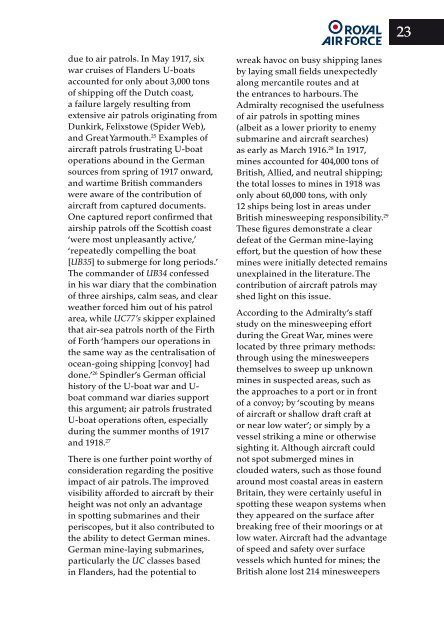Create successful ePaper yourself
Turn your PDF publications into a flip-book with our unique Google optimized e-Paper software.
due to air patrols. In May 1917, six<br />
war cruises of Flanders U-boats<br />
accounted for only about 3,000 tons<br />
of shipping off the Dutch coast,<br />
a failure largely resulting from<br />
extensive air patrols originating from<br />
Dunkirk, Felixstowe (Spider Web),<br />
and Great Yarmouth. 25 Examples of<br />
aircraft patrols frustrating U-boat<br />
operations abound in the German<br />
sources from spring of 1917 onward,<br />
and wartime British commanders<br />
were aware of the contribution of<br />
aircraft from captured documents.<br />
One captured report confirmed that<br />
airship patrols off the Scottish coast<br />
‘were most unpleasantly active,’<br />
‘repeatedly compelling the boat<br />
[UB35] to submerge for long periods.’<br />
The commander of UB34 confessed<br />
in his war diary that the combination<br />
of three airships, calm seas, and clear<br />
weather forced him out of his patrol<br />
area, while UC77’s skipper explained<br />
that air-sea patrols north of the Firth<br />
of Forth ‘hampers our operations in<br />
the same way as the centralisation of<br />
ocean-going shipping [convoy] had<br />
done.’ 26 Spindler’s German official<br />
history of the U-boat war and Uboat<br />
command war diaries support<br />
this argument; air patrols frustrated<br />
U-boat operations often, especially<br />
during the summer months of 1917<br />
and 1918. 27<br />
There is one further point worthy of<br />
consideration regarding the positive<br />
impact of air patrols. The improved<br />
visibility afforded to aircraft by their<br />
height was not only an advantage<br />
in spotting submarines and their<br />
periscopes, but it also contributed to<br />
the ability to detect German mines.<br />
German mine-laying submarines,<br />
particularly the UC classes based<br />
in Flanders, had the potential to<br />
wreak havoc on busy shipping lanes<br />
by laying small fields unexpectedly<br />
along mercantile routes and at<br />
the entrances to harbours. The<br />
Admiralty recognised the usefulness<br />
of air patrols in spotting mines<br />
(albeit as a lower priority to enemy<br />
submarine and aircraft searches)<br />
as early as March 1916. 28 In 1917,<br />
mines accounted for 404,000 tons of<br />
British, Allied, and neutral shipping;<br />
the total losses to mines in 1918 was<br />
only about 60,000 tons, with only<br />
12 ships being lost in areas under<br />
British minesweeping responsibility. 29<br />
These figures demonstrate a clear<br />
defeat of the German mine-laying<br />
effort, but the question of how these<br />
mines were initially detected remains<br />
unexplained in the literature. The<br />
contribution of aircraft patrols may<br />
shed light on this issue.<br />
According to the Admiralty’s staff<br />
study on the minesweeping effort<br />
during the Great War, mines were<br />
located by three primary methods:<br />
through using the minesweepers<br />
themselves to sweep up unknown<br />
mines in suspected areas, such as<br />
the approaches to a port or in front<br />
of a convoy; by ‘scouting by means<br />
of aircraft or shallow draft craft at<br />
or near low water’; or simply by a<br />
vessel striking a mine or otherwise<br />
sighting it. Although aircraft could<br />
not spot submerged mines in<br />
clouded waters, such as those found<br />
around most coastal areas in eastern<br />
Britain, they were certainly useful in<br />
spotting these weapon systems when<br />
they appeared on the surface after<br />
breaking free of their moorings or at<br />
low water. <strong>Air</strong>craft had the advantage<br />
of speed and safety over surface<br />
vessels which hunted for mines; the<br />
British alone lost 214 minesweepers<br />
23

















